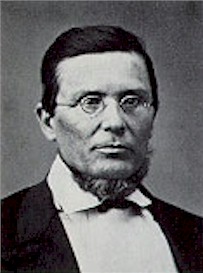- Thomas H. Watts
Infobox Governor
name = Thomas Hill Watts
order = 18th
office = Governor of Alabama
term_start = 1863
term_end = 1865
lieutenant =
predecessor =John Gill Shorter
successor =Lewis E. Parsons
birth_date =January 3 ,1819
birth_place =
death_date =September 16 ,1892
death_place =
party = Democratic
spouse =
profession =
religion =Thomas Hill Watts (
January 3 1819 ndashSeptember 16 1892 ) was the Democratic Governor of theU.S. state ofAlabama from 1863 to 1865, during the Civil War.Watts was born in the
Alabama Territory on January 3, 1819, the oldest of twelve children born to John Hughes Watts and Prudence Hill who had moved from Georgia to find the better lands of the frontier. Prepared for college at the Airy Mount Academy inDallas County , Watts graduated with honors from theUniversity of Virginia in 1840. He passed the bar examination the next year, and began practicing law inGreenville . In 1848 he moved his lucrative law practice to Montgomery. He also became a successful planter, owning 179 slaves in 1860.Politically, Watts adopted a pro-Union stance during the 1850s, but subsequent developments made the depth of his beliefs questionable, for on the eve of the Civil War he played an important role in the secession of Alabama, and was one of the signers of the secession ordinance. Defeated by
John Gill Shorter in an 1861 bid for governor, Watts organized the Seventeenth Alabama Regiment, but resigned later to becomeattorney general in PresidentJefferson Davis ' cabinet.In 1863 Watts was elected
Governor of Alabama . Assuming office on December 1, he began an eighteen-month governorship at a time when impressment, the tax-in-kind, and other severe wartime economic measures had become most odious. Worthless Confederate money, lack of credit possibilities, irregular supplies of goods, impressment efforts that often amounted to pillage and plunder, and harsh (and unevenly applied) taxes-in-kind levied on agriculture convinced many people that they preferred the "Old Union" to the "new despotism". The need to raise troops for the defense of the state became more urgent. Appeals to the male population to form volunteer companies and appeals to the state legislature to reorganize the state's awkward two-class militia were met with unsurmountable resistance. Some critics of Watts thought he should concentrate on forcing deserters back into military service. The legislature's failure to act meant that the state, and the Confederacy, would not have an effective militia in the final critical months of the war. Furthermore, the Confederate Conscription Act of February 17, 1864, inaugurated a policy of conscription that inevitably led to conflict between the state and the Confederacy.By September 1864 another turbulent issue confronted Governor Watts: the opening negotiations for peace. A faction in the
Alabama House of Representatives introduced resolutions in favor of the negotiations. Governor Watts was also faced with rising desertion rates, states' rights issues including the controversy over the conscription of the cadets at the University of Alabama, the issue of which state civil officials were exempt from conscription, the defense of Mobile, blockade-running, and cotton trading with Europe. During the winter of 1864-65, Governor Watts had to deal with the increasing number of sacrifices demanded of his state, the breakdown of authority, the drain on war power, and an evaporating hope of victory, all of which contributed to the state's war weariness. Governor Watts was well aware of his ineffectiveness and unpopularity by this time and made no effort toward re-election, although he continued to talk optimistically about the military situation. Arrested inUnion Springs on May 1, 1865, Governor Watts was released a few weeks later and returned to Montgomery.He died twenty-seven years later on September 16, 1892.
References
*McMillan, Malcolm C. The Disintegration of a Confederate State, Three Governors and Alabama's Wartime Home Front, 1861-1865, 1986.
*http://www.archives.state.al.us/govs_list/g_wattst.html
Wikimedia Foundation. 2010.
